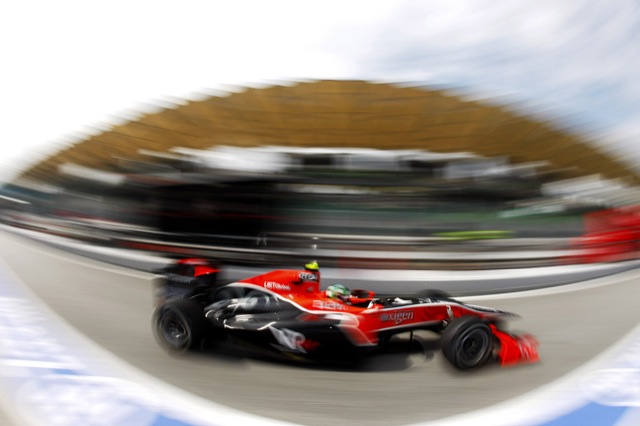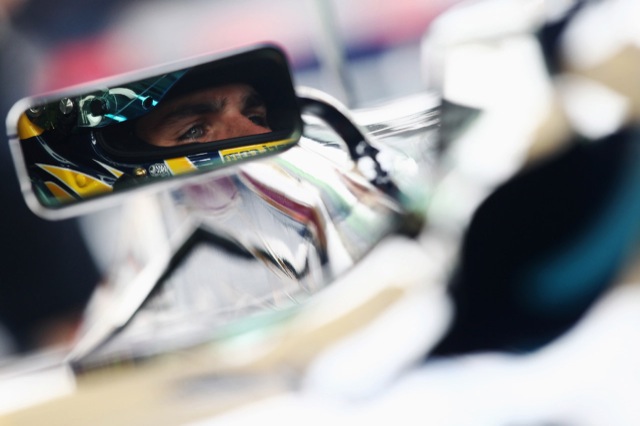 The FIA recently announced a raft of rule changes for the 2008 Formula One season, mostly met with chortles of laughter and quizzical looks around the world. In order to continue his dumbing down of the sport, and to add to the grey that is known as the rule book, FIA president Max Mosley stated that wind tunnel usage would be now be limited and team personnel attending the races would be capped to name just two of the cost-cutting measures. On the face of it Mosley’s ideas aren’t ridiculous and they would see costs reduced for the participants, but quite how the FIA intend to police these regulations is anybodies guess.
The FIA recently announced a raft of rule changes for the 2008 Formula One season, mostly met with chortles of laughter and quizzical looks around the world. In order to continue his dumbing down of the sport, and to add to the grey that is known as the rule book, FIA president Max Mosley stated that wind tunnel usage would be now be limited and team personnel attending the races would be capped to name just two of the cost-cutting measures. On the face of it Mosley’s ideas aren’t ridiculous and they would see costs reduced for the participants, but quite how the FIA intend to police these regulations is anybodies guess.
Trying offer some sort of reasoned voice though, Honda have stepped forward with something a little more sensible. Now, I should point out that I disagree with limiting the talents of the staff in Formula One, and therefore see no need the cap anything, but my view isn’t going to stop Mosley in his path and make him reconsider. So, what have Honda suggested?
Quite simply, they have said that if you want to reduce costs for Formula One teams, thus making the playing field a little more level and allow more players to join, just limit the total money the teams can spend during the year.
Ross [Brawn] and I both think that an overall budget cap is something that should be seriously investigated. What we see at the moment, if you look at the accounts of any of the UK F1 teams, is that the costs keep going up.
So far what we have been successfully doing is moving money from one area of the team to another. Money is certainly moved from engines to aerodynamics, because that is the next best area of performance advantage.
We support a lot of the proposals on the aero restrictions, but the fear is that that money will merely be diverted elsewhere. It will go to driver salaries or engineer salaries, or some other part of the car, but will not necessarily reduce the total bill that a team has to pay.
So rather than chasing our tails, we think we should be considering an overall budget cap. Although it will be difficult to monitor, we think it can be achieved. Nick Fry.
I like the honesty of Fry’s statement, saying that all the engine freeze has done is forced the teams to spend more on aerodynamic development and less on the power plants. The total spend is likely to be the same, if not more as Fry hinted at. Essentially, Honda’s F1 CEO has just slapped Mosley down, proving (from Honda’s point of view at least) that the teams are not saving money; they’re actually spending more.
We do support sensible efficiencies on cost and cost restraint. The difficult thing is applying it so it doesn’t advantage or disadvantage one team over another, and that’s the thing we need to focus on.
The concept of a budget cap a couple of years ago was thought to be fairly ludicrous. But if you look at the weaknesses of the counter-arguments and alternative solutions, you wonder whether budget-capping isn’t the one you ought to find a solution for. It gives everyone the opportunity they want to try and achieve the objective. Ross Brawn.
Brawn hit the nail on the head when he states that the cost-cutting rules need to be fair through the grid, ensuring that they don’t “advantage or disadvantage one team over another”. Unfortunately, Ross is about to see Formula One from a non-Ferrari standpoint. This at least should be interesting to watch next year.
The teams are also businesses, and like other limited companies, they need they’re accounts audited and in most circumstances, are made available for viewing. Combined with legislation within the rules, policing the costs spent by the squads would be far easier to manage than an FIA official standing guard at the wind tunnel. Which, by the way, adds to the costs of the governing body which would probably be passed down to the teams at some point.
I could pick holes in the aerodynamic argument. How do you police CFD? You have a processor and a number of people working at their workstations in the CFD department, but if you’ve got somebody off-site quite legitimately developing the code and then they put that enhanced code into your system, are they part of your CFD process or not?
I’m not saying a budget cap is the easiest thing to apply, but is it any more difficult than the other things we’re going to do? […] How fast can you make this car go for 100 million a year? How efficient can you be? And it’s up to the teams to decide whether they spend 50 million on the driver and 50 million on the car; or one million on the driver and 99 million on the car. It would be fascinating to have that challenge. Ross Brawn.
I like having Ross back in F1. And facing the challenge of reviving Honda away from the comforts of Maranello, the banana-munching brain-box can, has to think radically, perhaps even upsetting the establishment in the process. Like I said, Ross is going to make for some enthralling viewing in 2008.
But back to budget caps. Would it really work? Like all things in business, it isn’t rock-solid. Of course some teams would fudge the numbers, move and hide money, but is it any worse than trying to do some of the things the FIA are currently putting forward? It would actually promote innovation, developing systems without the comfort of the limitless money source, and it would definitely level out the grid a little.
As always, your views are more than welcome, so let me know what you think in the comments. Has Ross gone bananas, or does the green-fingered team principal speak as wisely as the green-bodied Yoda? Erm, budget caps: good or bad!?



















I wonder if Ross would be keen on cost cutting if he had went back to Ferarri?
Good point Michael. I will say though that putting Ross in circumstances that are favoured less by the rules will be interesting.
The manufacturers will still have limitless money, for the road departments will simply absorb the direct costs of the race teams Indirectly, they already pay for many of the costs of running the F1 team, and nearly all of them in Honda’s case. The only teams whose costs will be cut will be those teams that cannot pretend that other departments are getting the benefit – i.e. the non-manufacturers, who are presumably the ones that these measures were intending to help.
Doing nothing would be more helpful than the Brawn proposals. For different reasons, doing nothing would also be more helpful than the FIA’s idea of restricting innovation.
Well, it’s also interesting because Fry is rumored to be leaving Honda and taking over Mosley’s post at the FIA..
As to whether Brawn would say the same thing if he was still at Maranello then the answer is a clear “no”. There are other people running the PR department at Ferrari. Still, Honda just like most of the other manufacturers (except for Renault) will spend whatever it takes. BAR is very well funded indeed.
What’s really behind this is that Brawn knows full well that Ferrari and McLaren have written the rule books for Formula 1 for a decade now. Whenever anybody is catching up with them in one area, they rewrite the rules to give them an advantage in the other. When Mercedes had the best engine, nobody was talking about the cost of building them. Then when they lost their edge, engines were suddenly taken out of the equation for cost reasons. Leaving aerodynamics as the key differentiator: clearly a McLaren/ Ferrari speciality. Now that BMW and others are catching up on the full scale-24/7/365 wind tunnels, the FIA is going to limit their use for “cost reasons”. Funny that McLaren and Ferrari already have the largest and most mature CFD (computational fluid dynamics) departments, which will remain unaffected. Neither company is even remotely interesting in limiting costs; being able to spend limitless amounts of cash is one of their greatest advantages and the cash is not about to dry up anytime soon.
What Brawn’s idea would really do, is to remove Ferrari and McLaren’s ability to rewrite the rule book to suit their own strengths and the emphasize the weaknesses of their opponents.
Honda had a V12 1000+ hp engine before they were due to enter F1 as a new team almost a decade ago. They tested it and trounced the then leading teams. Six months later the rules were changed to require a V10 engine design because of a potential “cost explosion for everyone”, i.e. being beating to a pulp by a new rival.
I’m sure Ross was pleased no end by this when he was at Ferrari, but now that he’s at Honda he’s thinking “I can’t believe how you guys just let yourself be bossed around like this”. Expect a lot more pressure on the FIA from Honda in years to come.
A $100 million spending limit would suit Honda just fine. They are trying to showcase their ability to innovate and shaving 3 grams off the front suspension isn’t really what they understand best. They want to build engines. They build engines. Engine building is what they do. They WANT to build engines.. please let them.
Just my 5 euro-cents.
Since Brawn came from Benetton, which at that time did not have deep pockets … Schumacher won in 94 driving V8 Ford power, I think he’s seen both sides of the coin where available money for R&D is considered.
There’s always been dominance in teams since it’s inception, and unless you want to do away with the category system F1 manufactures have been dealing with forever, and replace it with a sterile, under the umbrella spec series, dominance will always prevail. It’s the nature of the sport.
I can’t see Ferrari or Mclaren showing concern over, oh, Force India, no matter what budget was in place.
I think budget capping is utterly un-implementable. Can you imagine the scale of the scandal if someone were found to have been substantially overspending?